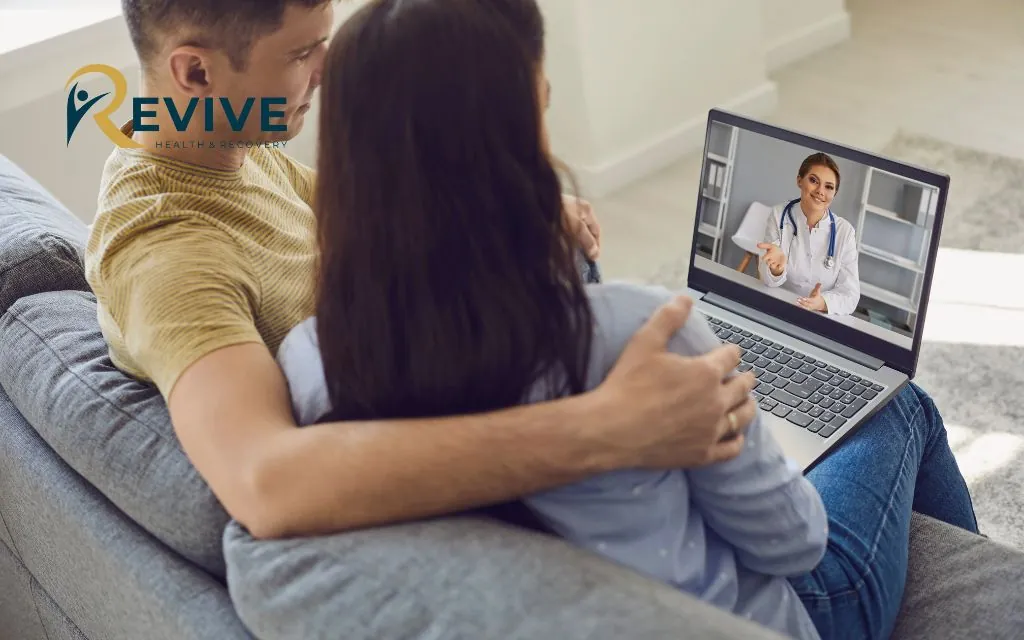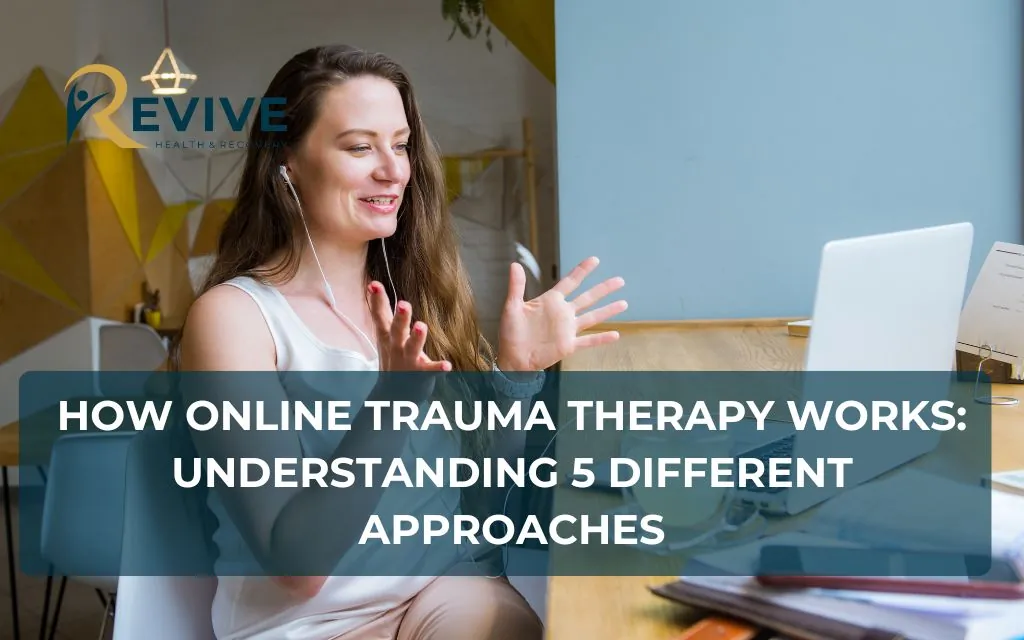In recent years, online trauma therapy has emerged as a critical resource for Denver residents seeking healing and support for trauma. The post-COVID landscape has transformed how we approach mental health care, with virtual services now meeting the growing demand for accessible, convenient trauma treatment. At Revive Health Recovery, we’ve witnessed firsthand how online therapy breaks down barriers, allowing more people to access the specialized care they need regardless of location or schedule constraints.
What is Online Trauma Therapy?
Definition and How It Works
Online trauma therapy delivers evidence-based treatment through secure videoconferencing platforms. This approach allows therapists to work with clients experiencing various trauma-related challenges, including PTSD, childhood trauma, and complex trauma. The virtual sessions maintain the same therapeutic principles as in-person care while eliminating geographical limitations.
The telehealth format creates a space where clients connect with therapists from home, using encrypted video technology that protects confidentiality. This approach preserves the therapeutic relationship while adding convenience for both parties.
Benefits for Denver Residents
Denver residents gain substantial advantages from online mental health services. The elimination of commute time serves busy professionals and parents who struggle to fit therapy into packed schedules. For those in Denver’s outlying areas or mountain communities, virtual options eliminate the need for long drives to access specialized trauma care, such as PTSD therapy in Denver.
The privacy factor also attracts many clients who prefer not to encounter others in waiting rooms. This discretion helps many overcome the initial hesitation about seeking trauma support.

Why Denver Chooses Online Trauma Therapy
Overcoming Local Barriers
Denver’s unique characteristics create specific challenges that telehealth effectively addresses. Our city’s notorious traffic congestion transforms what should be short commutes into significant time commitments. Weather conditions, particularly winter storms, often make travel hazardous. For residents in Denver’s expanding suburbs and surrounding rural communities, distance creates additional obstacles.
Virtual options ensure consistent care regardless of these external factors, reducing cancellations and maintaining therapeutic momentum.
Colorado-Licensed Therapists
Working with Colorado-licensed professionals remains essential for effective trauma therapy. State licensure ensures therapists understand local regulations, resources, and cultural contexts. Revive Health Recovery employs only properly credentialed trauma specialists who maintain all necessary Colorado qualifications.
These professionals understand Denver’s unique stressors, including the high cost of living, competitive work environment, and the city’s rapid growth challenges. This local expertise is especially valuable for tailored PTSD treatment in Denver, addressing both environmental and trauma-specific needs.
Best Online Trauma Therapy Platforms in Denver
National Options
Several national platforms serve Denver residents seeking trauma support. BetterHelp, with over 20,000 therapists, uses matching algorithms to connect clients with appropriate specialists. Talkspace offers similar services with different pricing structures and therapist selection approaches.
While these platforms provide convenience, they sometimes lack the local context that Denver-specific providers offer. When considering these options, verify the therapist’s Colorado licensure and trauma-specific credentials.
Local Providers with Virtual Services
For Denver residents seeking a personalized touch, local providers like Revive Health Recovery offer robust virtual services. Their “virtual section” allows clients to access tailored trauma therapy from the comfort of home, combining the convenience of online care with the expertise of Denver-based professionals. This makes it an ideal choice for those who value both flexibility and local support.
The advantage of working with established Denver providers extends beyond therapy sessions. Local therapists maintain connections with community resources, allowing for comprehensive care coordination when clients need additional services or support.

Key Trauma Therapies Available Online
EMDR Therapy
Eye Movement Desensitization and Reprocessing (EMDR), developed by Francine Shapiro in 1987, has transformed trauma treatment. This evidence-based approach uses bilateral stimulation to help the brain process traumatic memories, reducing their emotional impact and associated symptoms.
For those seeking innovative alternatives, virtual reality therapy for trauma exposure offers a cutting-edge approach to processing traumatic memories.
Telehealth virtual EMDR sessions in Denver adapt traditional protocols for online delivery. Therapists guide clients through the process using visual cues on screen or audio tones through headphones. Research demonstrates the effectiveness of this virtual adaptation, making it accessible to more people who need this specialized intervention.
Brainspotting Therapy
Online Brainspotting therapy, developed by David Grand in 2003, focuses on identifying specific eye positions connected to traumatic memories. Unlike EMDR, Brainspotting emphasizes maintaining fixed eye positions that access the brain’s trauma processing centers.
This approach translates effectively to virtual settings, where therapists guide clients through finding and maintaining these eye positions during screen-based sessions. Denver clients report powerful results from this less widely known but highly effective trauma resolution technique.
CBT, DBT, and More
Beyond specialized trauma protocols, online therapy effectively delivers other evidence-based approaches. Cognitive Behavioral Therapy (CBT) helps identify and change trauma-related thought patterns, while Dialectical Behavior Therapy (DBT) builds emotional regulation and distress tolerance skills.
Many Denver therapists combine approaches based on individual client needs, creating integrated virtual trauma counseling, including intensive trauma therapy, that addresses both immediate symptoms and underlying trauma patterns.
Finding Your Ideal Denver Trauma Therapist
Choosing the Right Fit
Finding the right virtual trauma therapist requires attention to several key factors. First, verify Colorado licensure and specific trauma credentials such as EMDR certification or advanced trauma training. Next, consider specialization—some therapists focus on specific trauma types like combat trauma, sexual assault, or childhood adversity.
Personal connection matters significantly in trauma work. Take advantage of free consultation calls offered by many Denver providers to assess comfort level and communication style. Remember that effective trauma therapy requires trust and rapport, which depends on personal chemistry as much as professional qualifications.
However, for those exploring self-guided options, learning how to heal from childhood trauma without therapy can complement professional care.
Warning Signs to Avoid
Be cautious of potential red flags when seeking online trauma support. Unlicensed providers, those making exaggerated promises of rapid healing, or therapists unable to explain their trauma approach clearly should raise concerns. Additionally, poor communication regarding session structure, cancellation policies, or technical requirements indicates potential problems.
Legitimate trauma specialists will discuss treatment limitations openly and develop clear safety protocols for virtual work. They’ll also respect boundaries and never pressure clients to disclose more than they’re comfortable sharing.

Preparing for Your First Session
Tech Essentials
Successful online therapy requires basic technical preparation. Ensure you have stable internet connectivity, functioning video and audio capabilities, and a device with sufficient battery life or power connection. Test your setup before your first appointment to identify and resolve potential issues.
Create a private, comfortable space for your sessions—preferably a room with a door you can close. Use headphones to enhance audio quality and privacy. Have backup contact methods available in case technical difficulties interrupt the session.
What to Expect
When you book an online trauma therapy session in Denver, understand that the first appointment typically focuses on assessment rather than immediate trauma processing. Your therapist will explain their approach, discuss confidentiality limitations, and gather background information. They’ll also establish safety protocols specific to virtual work.
Come prepared with questions about the process and share your therapy goals. Remember that trauma work proceeds at your pace—effective therapists never rush the process or force confrontation with traumatic material before establishing safety and coping skills.

Is Online Trauma Therapy Effective?
Evidence and Studies
Research consistently demonstrates the effectiveness of online trauma therapy, as supported by insights from the American Psychological Association on the efficacy of telehealth interventions. Multiple studies comparing virtual and in-person treatment show comparable outcomes for conditions like PTSD. A 2021 meta-analysis published in the Journal of Anxiety Disorders, available via the National Center for Biotechnology Information, found no significant differences in symptom reduction between delivery methods.
Specific trauma approaches like EMDR and CPT (Cognitive Processing Therapy) have been successfully adapted for telehealth with maintained efficacy. While the research continues to evolve, current evidence strongly supports virtual trauma treatment as a legitimate and effective option.
When to Opt for In-Person
Despite its benefits, online trauma therapy isn’t appropriate for every situation. Clients experiencing severe dissociation, active suicidal ideation, or those lacking privacy at home may need in-person support. Some trauma processing techniques requiring physical touch or specialized equipment work better in traditional settings.
Most Denver providers, including Revive Health Recovery, offer both virtual and in-person options, allowing for flexible care based on changing client needs and circumstances.

Affordable Options in Denver
Insurance Coverage
Insurance coverage for online trauma therapy has expanded significantly since 2020. Most major insurers now cover telehealth services, though specific policies vary. Colorado has strengthened telehealth parity laws, requiring insurers to reimburse virtual services at rates comparable to in-person care.
When exploring affordable virtual trauma counseling in Denver, verify coverage directly with your insurance provider. Many Denver therapists offer insurance verification services to clarify benefits before beginning treatment.
Low-Cost Solutions
For those without adequate insurance coverage, Denver offers several affordable alternatives. Many providers offer sliding scale fees based on income. Community mental health centers throughout the metro area provide reduced-cost virtual services. Additionally, training clinics at local universities often deliver supervised telehealth at significantly reduced rates.
Several Denver-based nonprofits specialize in trauma support and maintain virtual programs with accessible pricing structures. These organizations frequently receive grant funding that subsidizes care for qualifying individuals.

Booking Your Session Made Simple
Step-by-Step Guide
The process to find and book a virtual trauma therapist has become streamlined. Start by researching providers through directories like Psychology Today, filtering for trauma specialization and telehealth options. Review websites to assess approach compatibility and verify credentials.
Reach out to selected therapists via phone or email with basic questions about availability, cost, and approach. Many Denver providers offer online booking systems that display available appointment times. The initial consultation typically occurs within 1-2 weeks of first contact, though wait times vary based on demand.
Revive Health Recovery’s Process
At Revive Health Recovery, we’ve developed a straightforward booking process for online trauma therapy. Our website features a secure portal where clients complete initial paperwork and select available appointment times. New clients receive a confirmation email containing session links and preparation instructions.
Our intake process includes a thorough assessment of trauma history and symptoms, allowing us to match clients with the most appropriate specialist and approach. This personalization ensures effective treatment for trauma from the beginning of the therapeutic relationship.

FAQs About Online Trauma Therapy
Is online trauma therapy as effective as in-person therapy?
Yes. Research consistently shows comparable outcomes between online and in-person trauma therapy. A 2023 study in the Journal of Traumatic Stress demonstrated equivalent PTSD symptom reduction in both formats. At Revive Health Recovery, our outcomes data reflects this research, with similar improvement rates across delivery methods.
Can EMDR therapy work effectively online?
Absolutely. EMDR has been successfully adapted for online delivery with modifications to the bilateral stimulation component. Therapists utilize on-screen movement, audio tones, or client self-administered bilateral tapping. Research confirms these adaptations maintain the effectiveness of traditional EMDR protocols. Revive Health Recovery specializes in telehealth virtual EMDR sessions in Denver, providing the full protocol remotely.
How much does online trauma therapy cost in Denver?
Costs range from $100-200 per session for private practice therapists, though insurance typically reduces this to copay amounts ($20-50). Revive Health Recovery accepts most major insurance plans and offers competitive self-pay rates based on therapist experience level. Community resources may provide sessions as low as $30 for qualifying individuals.
Are there free online trauma therapy options in Denver?
While free ongoing therapy is limited, several Denver resources provide initial support. The Colorado Crisis Services offers free virtual consultations and referrals. Time-limited trauma support groups through community organizations sometimes provide free participation. Revive Health Recovery offers periodic free workshops and maintains a community resource directory to help connect clients with all available options.
Ready to Begin Your Healing Journey
Online trauma therapy has revolutionized access to healing for Denver residents, combining clinical excellence with unprecedented convenience. The virtual format removes traditional barriers while maintaining the effectiveness of evidence-based trauma treatment.
Whether you’re seeking EMDR, Brainspotting, or other trauma-focused approaches, qualified Denver providers stand ready to support your healing journey. With options ranging from large telehealth platforms to local specialists like Revive Health Recovery, finding the right fit has never been more accessible.
Ready to take the first step? Book your online trauma therapy session with Revive Health Recovery today and experience the perfect balance of Denver professional expertise and convenient care. Your healing journey begins with a single click.



